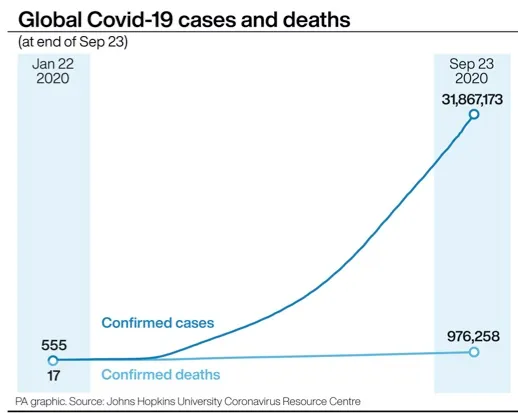Adopting a “zero-COVID” strategy like in New Zealand should be considered by governments around the world as the most effective method of fighting the coronavirus, scientists have said.
In a review published in the journal Lancet, a team of international experts outlined the key lessons learned from experiences of other countries in tackling the disease.
The authors wrote: “The argument is strong for countries adopting a so-called zero-COVID strategy, which aims to eliminate domestic transmission.
“The New Zealand experience shows that this strategy is challenging but is an important aspiration, not least as the growing burden of so-called long COVID becomes apparent in people who have survived COVID-19 but continue to have symptoms for longer than expected.”
Read the latest coronavirus news:
- Everything you need to know about the NHS contact-tracing app
- Shoebox-sized coronavirus test kit gives results in just 90 minutes
- Rehab vital for long COVID patients
However, other experts argue that the jury is still out on the New Zealand approach and that much of its success will rely on the rapid development and deployment of an effective vaccine.
“If a working vaccine is available sooner rather than later, and New Zealanders can be immunised quickly and en masse, it will look like a great policy,” said Dr Simon Clarke, associate professor of cellular microbiology at the University of Reading, who was not involved in the review.
“However, if vaccines aren’t available fast enough, New Zealand will increasingly be vulnerable to infection from abroad, and will have to maintain costly global isolation to protect its public.”

In the Lancet paper, the scientists also laid out four key factors they think should be considered in any lockdown exit strategies:
- An effective test, trace, isolate and support system;
- A clear plan with a transparent decision-making process from the government;
- Robust systems to closely monitor the infection situation before easing restrictions;
- Prolonged control measures to reduce coronavirus transmission – including face masks and social distancing.
The researchers also point out the methods and success of contact tracing and isolation have varied significantly across countries, with many Asian nations promptly mass testing, tracing and isolating all cases from the start of the outbreak, while these processes have been considerably delayed in the UK and in most of Europe.
“As some countries around the world begin to see a resurgence in cases and re-tighten restrictions, it is imperative that countries learn the lessons that we’ve laid out for the future," said co-author Prof Martin McKee, of London School of Hygiene & Tropical Medicine.
Can I get the coronavirus twice?
There have been a few stories in the press of people apparently being re-infected by thecoronavirusSARS-CoV-2. These people reportedly became infected and hospitalised, and then were sent home once they’d tested negative for the virus. Then, days or weeks later, they tested positive again.
But this doesn’t necessarily mean that they caught the coronavirus twice.
First, during recovery from infection, a person may have very low amounts of the virus remaining in their body – low enough that our tests can’t accurately detect it. In this case, the person may be sent home on the assumption that they’re virus-free. However, their body may still be fighting the virus, and a resurgence of the virus (and symptoms) can occur, resulting in a positive test. In this case, it would just be one protracted infection, not a re-infection.
Second, we know that in most people, SARS-CoV-2 generates a strong response from the immune system. With the related coronavirus SARS-CoV, this response creates an immune memory of the virus that prevents re-infection for one to two years, and it’s likely that this is also the case for the new virus. SARS-CoV-2 also has a fairly low mutation rate, which means that it (hopefully) won’t change enough that our immune system no longer remembers it (this is what the flu virus does and why we need a new jab every year).
If this all turns out to be true, then it would suggest that re-infections are unlikely and that the cases in the news reflect testing sensitivity. However, SARS-CoV-2 is so new that we won’t know for sure until we’ve found out just how protective our immune response to the virus is, and how long it lasts.
Read more:
